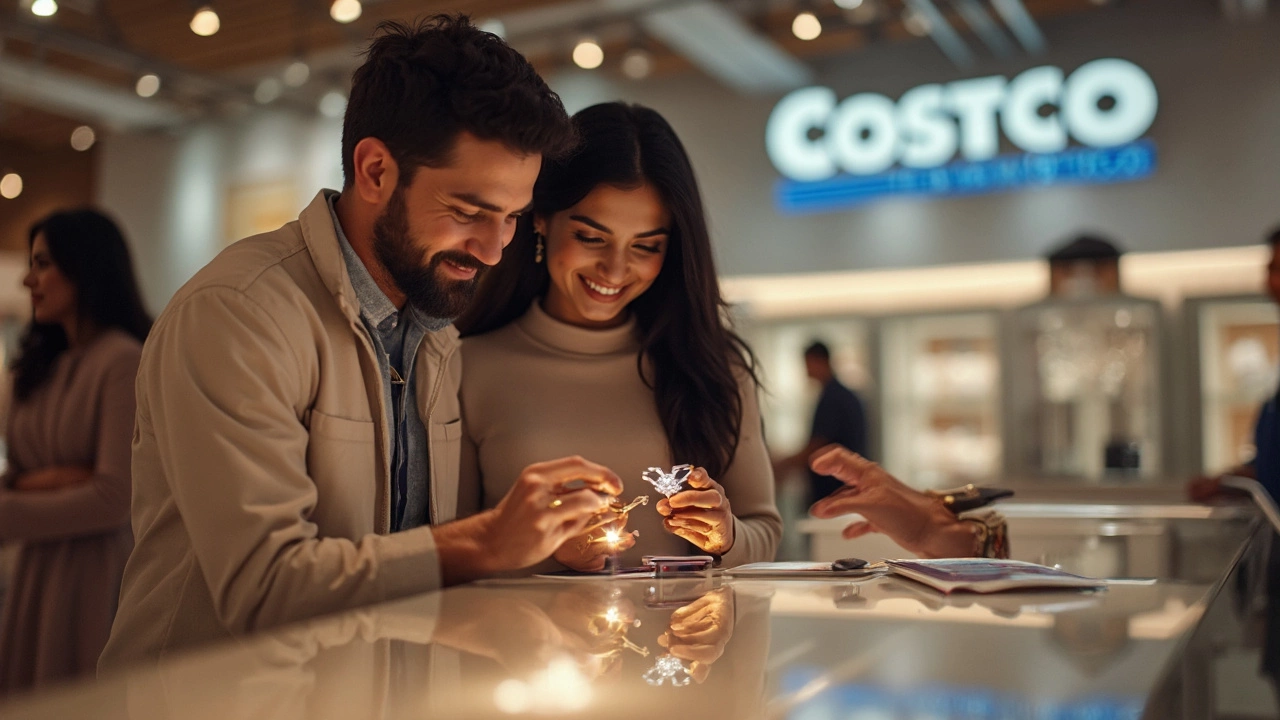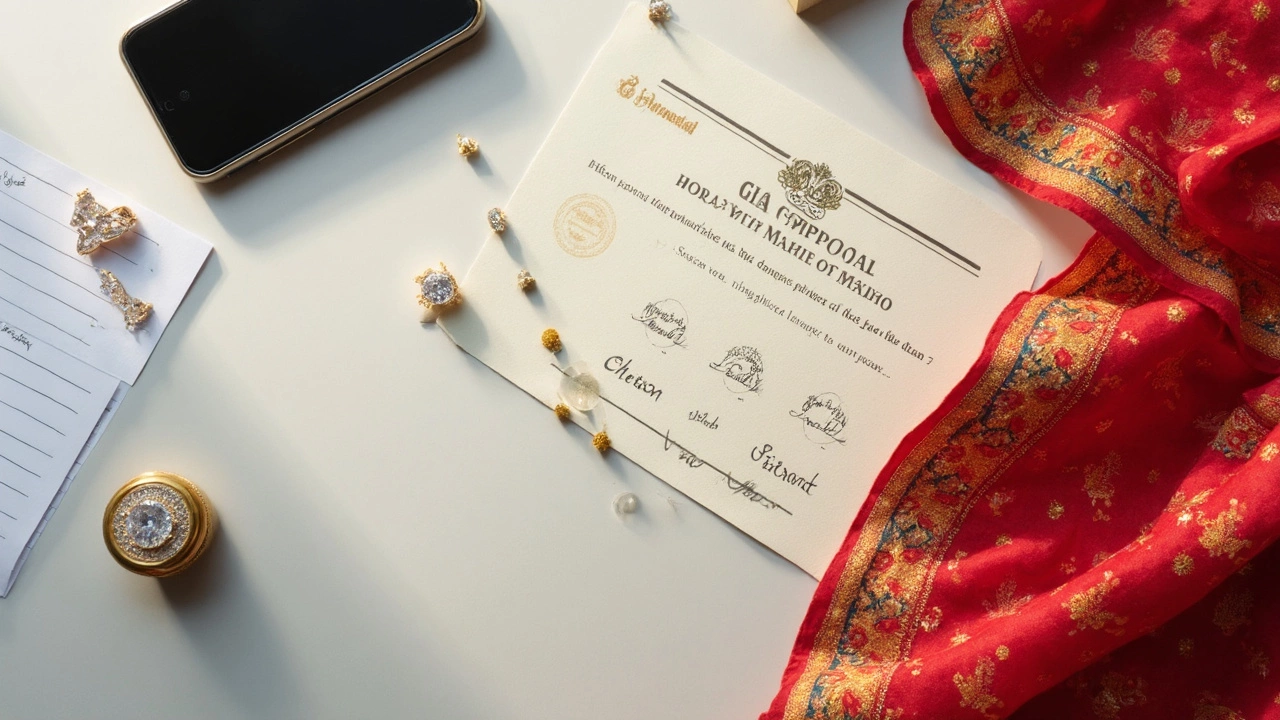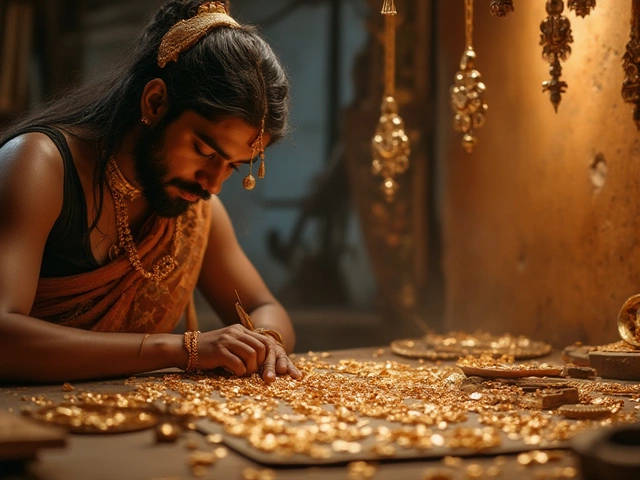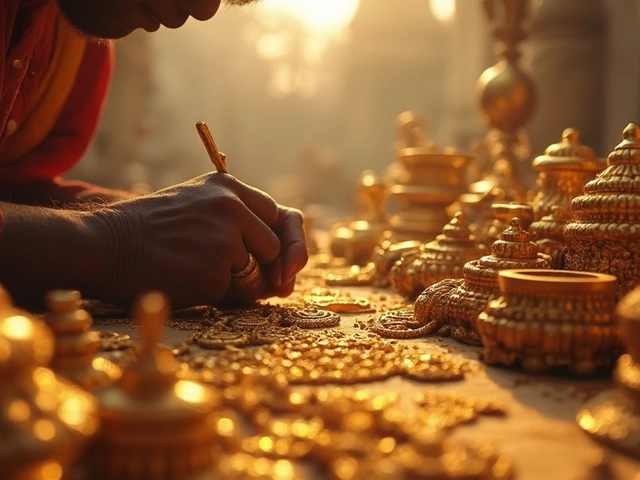
So, you're eyeing a diamond ring at Costco and the price seems almost too good to be true. But what about the paperwork? If you’ve heard that diamonds should come with a GIA certificate, you’re on the right track. This little piece of paper is like a report card for your diamond—it tells you if your sparkle is the real deal.
Not every diamond you see, even in big retail stores like Costco, automatically gets the GIA stamp. Some do, some don’t. And if you’re shopping online from India or sending a ring as a gift, you really want to know how to check before you drop your cash. The GIA certificate isn’t just a fancy add-on—it protects you from paying too much and helps if you ever want to sell or upgrade your stone.
- What is a GIA Certificate?
- How Costco Sources and Grades Diamonds
- Which Costco Diamonds Have GIA Certification?
- How to Check for Diamond Certification at Costco
- Why GIA Papers Matter for Value and Trust
- Tips for India-Based Buyers Shopping at Costco
What is a GIA Certificate?
If you’ve ever looked at buying a diamond, you’ve probably heard about GIA certificates. These aren’t just random bits of paper—GIA stands for Gemological Institute of America, which is like the most trusted referee in the diamond world. When a diamond comes with a GIA certificate, it means the stone has been lab-checked by independent experts, not just the seller. That’s huge when you’re spending big money.
This certificate breaks down all the stuff you need to know about the diamond, including the famous 4Cs: carat weight, cut, color, and clarity. The report also notes if the diamond got any treatments or enhancements. Here’s what you can expect to see on a GIA certificate:
- Exact weight of the diamond (to the second decimal point)
- Description of shape and cutting style (like round, princess, etc.)
- Color and clarity grading (on specific scales, not just vague terms)
- Cut grade, which tells you if it sparkles like crazy or just so-so
- Measurements and proportions
- Laser inscription (sometimes), which you can see under a microscope
- Comments on any treatments or inclusions
To make things concrete, here’s a quick breakdown of GIA grading compared to common diamond certifications:
| Certification | Grading Standards | International Trust Level |
|---|---|---|
| GIA | Strict, consistent | Highest |
| IGI | Reliable, less strict | Medium-High |
| HRD | European standard, decent consistency | Medium |
| In-house (Retailer) | Varies, not always strict | Low-Medium |
The main reason people care about a GIA certificate is because it makes the whole diamond buying thing transparent. You know you’re not simply taking the seller’s word for it. This sort of proof is a game changer, especially if you’re buying from a big chain like Costco or considering shipping a diamond ring to India.
How Costco Sources and Grades Diamonds
Costco works with a lineup of diamond suppliers—most are big international dealers, not small local shops. They focus on buying diamonds in bulk, so they can score better deals and pass on the savings. But buying in bulk has another side: not every stone gets top-tier paperwork like a GIA certificate right out of the gate.
Costco says their diamond jewelry meets strict quality standards, and they back this up by requiring stones in their jewelry to be at least "VS2" clarity and "I" color or better. That means the diamonds you see there aren’t low quality, even if they're not always wrapped in a pile of certificates.
The grading itself can differ by product. Here’s how it usually breaks down at Costco:
- Loose diamonds (those not set in a ring) and some high-value rings usually come with a GIA certificate as proof of independent assessment.
- Smaller or lower-priced stones, like those in pave settings, may only be graded in-house or by Costco suppliers rather than GIA.
- Costco often describes the quality standards in their online listings and on product tags, so double-check the fine print before you buy.
Here’s a quick snapshot of what Costco typically promises for their diamond rings:
| Diamond Aspect | Costco Standard |
|---|---|
| Clarity | VS2 or better |
| Color | I or better |
| Certification | GIA on select items |
Here’s the bottom line: The Costco diamonds that come with a GIA certificate are usually the ones worth over a certain amount or sold as loose stones. If you’re into specs or shopping for something super valuable, always hunt for that GIA mention in the product description. If you’re buying something smaller, you’ll probably see a general quality promise, but not the official GIA paperwork.
Which Costco Diamonds Have GIA Certification?
Here’s the straight answer: Not every diamond at Costco comes with a GIA certificate. But a decent chunk of their diamond jewelry, especially the bigger-ticket items like engagement rings or loose stones, does. Costco’s website makes it a lot clearer than shopping in person, so that’s usually where you can find all the fine print.
Most center stones of 1 carat or above in engagement rings—or loose diamonds—are the ones that typically come with a GIA certificate. Smaller diamonds, or the little stones that surround a ring, don’t usually get this paperwork because GIA certification costs more than the tiny diamond itself.
Here’s what you’ll usually see at Costco:
- Rings with a single center diamond over 1 carat — often GIA certified.
- Loose diamonds (0.75 carat and up) — almost always GIA certified, check the product description.
- Diamond stud earrings and tennis bracelets — usually not GIA certified because of the high number of small stones.
Always check the online product details. Costco lists diamond grading either right in the description or under the "Specifications" tab. Look for terms like "GIA Certificate Included" or a GIA report number. If it just says "IGI" or "Costco Appraisal," that’s not the same standard.
| Diamond Item | GIA Certificate? | How to Check |
|---|---|---|
| Engagement Rings (Center Stone > 1ct) | Often Yes | Product Description Online |
| Loose Diamonds | Usually | GIA Report Number Listed |
| Stud Earrings | No | Usually Not Graded per Stone |
| Multi-Stone Bands/Bracelets | No | Small Stones Not Certified |
In-store, just ask to see the certificate or the invoice, since for qualifying items, Costco will supply the GIA report card. If you’re buying online and don’t spot it in the details, hit up their customer service chat—they’re pretty responsive about sending proof if the item is graded by GIA.

How to Check for Diamond Certification at Costco
Buying a diamond from Costco? You need to know exactly what you're getting—and that means looking for proof, not just taking someone’s word for it. The easiest way to see if a diamond has a GIA certificate is to start on the product page, whether you’re shopping in-store or online. Costco usually states right in the description if a diamond is certified, and who did the grading.
When you scroll through Costco’s diamond listings, you’ll spot a few phrases. "GIA certified" or "GIA report included" means you’ll get a report from the Gemological Institute of America—the gold standard for grading. Sometimes, you’ll see IGI (International Gemological Institute) instead. IGI is legit, but GIA is what most people trust the most.
- Always look for the words: “GIA certificate included” or “GIA graded.” If you can’t find that, it probably doesn’t come with one.
- Check the photo gallery—Costco often uploads an image of the grading certificate in the product images.
- Read the item details for the certification number. You can double-check this on the GIA website to make sure it’s authentic.
- If you’re in a warehouse, ask a sales staff member to show you the paperwork. They should be able to produce a copy if it’s a certified diamond.
The majority of Costco's solitaire diamond rings over 1.00 carat tend to come with a GIA certificate, but small stones and many multi-stone items usually don’t. Here’s a quick comparison to keep it all straight:
| Diamond Type at Costco | GIA Certification Included? |
|---|---|
| Solitaire (1.00 ct and up) | Usually Yes |
| Solitaire (below 1.00 ct) | Sometimes |
| Multi-stone Rings | Rarely |
| Earrings& Bracelets | Rarely |
If you’re shopping from India or sending a gift, double-check the digital listing and keep screenshots of the certification info. Costco support can confirm most certificate details if you give them the item number. When in doubt, avoid any diamond with missing or vague certificate info. You want the peace of mind (and resale value) that a real GIA paper brings.
Why GIA Papers Matter for Value and Trust
When you’re thinking about spending serious money on a diamond, that GIA paper isn’t just paperwork—it’s real proof your stone is what it claims to be. The Gemological Institute of America (GIA) is known worldwide for being strict and consistent. That means a diamond with a GIA report is what it says on the tin. Why does this matter? Well, value and trust go hand-in-hand.
The certificate lists all the key details—carat, color, clarity, and cut—rated by lab experts. Anyone in the trade trusts these numbers. Imagine trying to sell or upgrade your diamond later. Without GIA, it’s just your word versus someone else’s. With the paper, buyers or even pawnshops know exactly what they’re dealing with.
Let’s break it down with a quick comparison. Here’s what a GIA-certified diamond usually means for value, versus one that’s uncertified or has a less credible certificate:
| Diamond Type | Buyer Trust | Resale Value | Typical Market Price |
|---|---|---|---|
| With GIA Certificate | High | Strong | Premium |
| Without GIA or Lesser Lab | Low to Medium | Weak | Lower/Negotiable |
Another thing: about 95% of jewelers in major Indian cities say a GIA certification speeds up the sale process, especially for larger stones. If you ever want diamond insurance, most companies ask to see the GIA document first. No certificate means more paperwork, more phone calls, and sometimes, higher costs.
So if you’re looking at Costco diamonds for your big day, those GIA papers aren’t just nice to have—they’re your best backup for everything: value, trust, resale, and even settling disputes later on.
Tips for India-Based Buyers Shopping at Costco
Shopping for diamonds at Costco when you're in India, or shopping for someone there, needs a bit of attention to detail. Before you add that shiny ring to your cart, there are a few key things to check to make sure you actually get what you pay for.
- Check Certification: Not all diamond rings at Costco come with a GIA certificate, especially smaller stones or jewelry with multiple small diamonds. Always check the product description for mention of a GIA report number. If it's missing, ask customer support for specifics before buying.
- Customs and Import Fees: India has strict regulations for importing jewelry. You may face customs duty on imported diamond rings—sometimes up to 20-25%. Factor this into your budget.
- Authenticity Verification: If your diamond arrives with a GIA certificate, match the grading report number on the certificate with the laser inscription on the stone (if available). This extra check guards against mix-ups.
- Returns Policy: Costco has an excellent return policy, but be sure about return shipping costs and customs rules from India. Some users have reported lengthy delays and charges for refunds on international returns.
- Value Check: Compare the same diamond specs (carat, color, clarity, cut) with local Indian jewelers or Tanishq. Sometimes local deals can compete, especially once duties and shipping are factored in.
Costco says,
"Every diamond of 1.00 carat or larger purchased on Costco.com is accompanied by a GIA or IGI laboratory certificate."If your ring is under one carat, double check what certificate (if any) it comes with—it could be an in-house appraisal, which isn't the same.
Here's a handy breakdown to compare current (2025) costs and key facts for India-based buyers:
| Feature | Costco Diamonds | Indian Retail Chains |
|---|---|---|
| Certificate Provided | GIA for 1ct+, Mixed or None below 1ct | Mostly IGI or in-house, some offer GIA |
| Import Duty (to India) | Approx. 20-25% | None (already included) |
| Return Policy | Flexible, but cross-border returns are complex | Varies by store, usually stricter |
| Customization | Limited | Wide range, made-to-order options |
If you’re after a Costco diamond with the peace of mind of a GIA cert and you're in India, check all those boxes before your purchase. Sometimes the bargain isn’t as sweet once taxes and shipping stack up. Always make the math work for your specific situation and don't be shy about grilling customer support—they're used to it!


